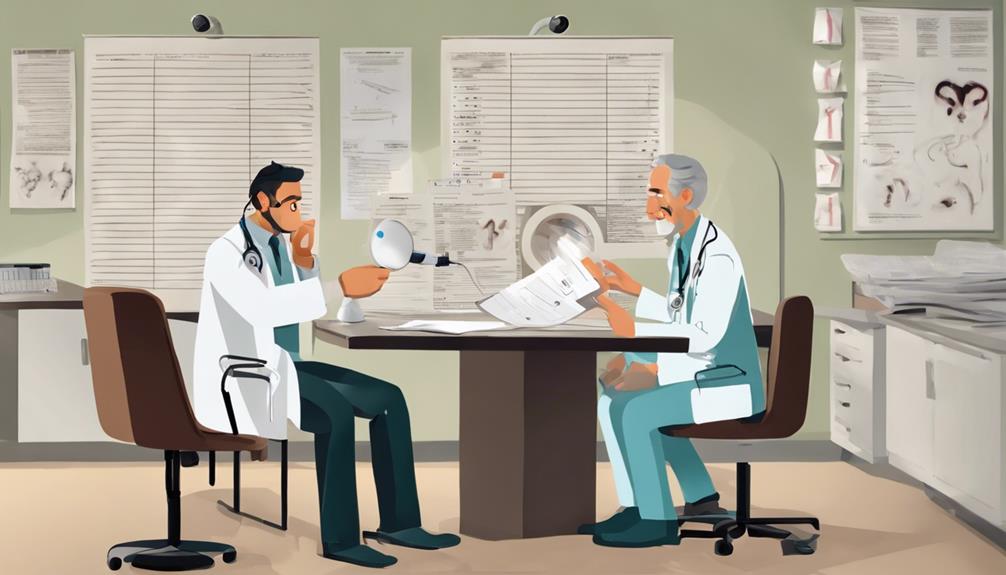Approximately 15% of adults in the United States report having some difficulty hearing. It is important to recognize the signs of hearing loss, but do you really know if you are losing your hearing? Many individuals ignore subtle changes in their hearing until it becomes a bigger problem.
Let's explore the common signs, early symptoms, impact on daily life, and what steps you can take to address potential hearing loss effectively.
Key Takeaways
- Recognize early signs like struggling with conversations and increasing volume on devices.
- Pay attention to muffled speech, sensitivity to loud noises, and difficulty in noisy settings.
- Understand that avoiding social settings, misinterpreting speech, and withdrawal indicate hearing issues.
- Seeking professional evaluation is crucial for accurately assessing and addressing potential hearing loss.
Understanding Hearing Loss
Understanding hearing loss is crucial for recognizing the signs and seeking appropriate interventions to address any potential issues effectively. Hearing loss can manifest gradually or suddenly, impacting individuals of all ages. Common signs of hearing loss include struggling to understand speech, needing to increase volume levels, and experiencing ringing in the ears.
It's essential to be aware of these signs to prompt early detection and intervention, which are vital for managing and treating hearing loss effectively. Various causes contribute to hearing loss, such as exposure to loud noises, the natural aging process, and underlying medical conditions. By understanding the causes of hearing loss, individuals can take proactive steps to protect their hearing health.
Seeking assistance from a healthcare professional or audiologist is crucial for a comprehensive evaluation and appropriate management of any hearing issues that may arise. By staying informed and proactive, one can address hearing loss effectively and enhance their overall quality of life.
Common Signs of Hearing Loss

When identifying common signs of hearing loss, individuals may notice a range of indicators that suggest potential auditory challenges. Difficulty hearing conversations, requiring higher volumes for TV or music, and struggling to hear in noisy environments are prevalent signs of hearing loss. Additionally, muffled speech and sounds, ringing in the ears (tinnitus), and avoiding social settings due to hearing issues are common indicators.
Asking for repetitions, difficulty understanding high-pitched sounds, and sensitivity to loud noises are also potential signs of hearing loss. Changes in phone call clarity, challenges in following group conversations, and a gradual decline in hearing acuity may signify the onset of hearing loss.
Recognizing these signs early on is crucial. Seeking professional evaluation and considering hearing aids as a solution can help address and manage hearing issues effectively. It's essential to be proactive in addressing any potential signs of hearing loss to maintain a high quality of life and communication abilities.
Recognizing Early Symptoms
As we explore the early symptoms of potential hearing loss, it's crucial to pay attention to signs like struggling to follow conversations, frequently asking for people to repeat themselves, and feeling the need to increase the volume on devices.
Additionally, noticing sounds becoming muffled, experiencing ringing in the ears, or feeling more sensitive to loud noises can be early indicators that shouldn't be ignored.
These initial signs may manifest as withdrawal from social situations, difficulties in noisy environments, and challenges during phone calls, prompting the importance of seeking professional evaluation to address any potential hearing issues promptly.
Hearing Loss Signs
Early signs of hearing loss can manifest as muffled speech and sounds, difficulty understanding words, and a tendency to avoid noisy social settings. Individuals experiencing hearing loss may find themselves increasingly sensitive to loud noises, needing to raise the volume on devices like the TV.
Feeling clumsier than usual and struggling to discern high-frequency sounds are additional signs that could point to potential hearing issues. Moreover, difficulties following conversations, engaging in phone calls, and withdrawing from social interactions can all indicate early symptoms of hearing loss. Sensitivity to loud noises and experiencing tinnitus (ringing in the ears) are also common indicators that shouldn't be overlooked.
If you notice these signs, seeking professional advice promptly is crucial to managing your hearing health.
Communication Difficulties
Recognizing early signs of communication difficulties, such as struggling to follow conversations and frequently requesting repetitions, is crucial for identifying potential hearing issues.
When it comes to communication challenges related to hearing loss, consider these key points:
- Misinterpreting speech and needing higher volumes on devices may indicate underlying hearing loss.
- Withdrawal from social settings due to difficulty in understanding speech can be an early sign of potential hearing impairment.
- Increased sensitivity to loud noises and struggles in noisy environments could also be early symptoms of hearing loss.
Being mindful of these signs and symptoms can help individuals address potential hearing issues proactively and seek appropriate interventions to improve their quality of life.
Seeking Professional Evaluation
When detecting early symptoms such as muffled speech or difficulty understanding words, it is essential to promptly seek professional evaluation for potential hearing issues. Seeking professional evaluation for hearing loss is crucial in ensuring early detection and effective management of any problems. Consulting an audiologist for a comprehensive hearing assessment can provide valuable insights into the extent of hearing loss and appropriate interventions. Prompt medical attention is necessary, especially in cases of sudden changes in hearing, to address the issue promptly. By proactively seeking professional evaluation, individuals can take the necessary steps to preserve their hearing health and address any potential issues before they worsen.
| Early Symptoms | Importance of Evaluation |
|---|---|
| Muffled speech | Ensures early detection |
| Difficulty understanding words | Facilitates effective management |
Impact on Daily Life

Hearing loss can significantly impact daily life, affecting communication, balance, cognitive functions, and social interactions.
- Communication: Difficulty in hearing can lead to challenges in understanding conversations, causing individuals to miss out on crucial information and affecting their ability to engage effectively in social interactions.
- Balance: Hearing loss can impact balance and spatial awareness, potentially increasing the risk of falls and accidents during daily activities.
- Cognitive Functions: Straining to hear can lead to short-term memory issues, reduced comprehension of humor, and difficulties in processing jokes, impacting cognitive functions and overall mental sharpness.
These effects of hearing loss highlight the importance of addressing auditory health to maintain a high quality of life. Seeking assistance through hearing aids and professional evaluation can significantly improve communication, enhance balance, and preserve cognitive abilities, ultimately fostering better social interactions and overall well-being.
Causes of Hearing Loss

Exposure to loud noises, aging, genetic factors, medical conditions, and traumatic injuries can all contribute to hearing loss. Loud sounds, like prolonged exposure to loud music or working in noisy environments, can damage the delicate structures in the inner ear, leading to hearing impairment. Aging is a natural process that affects the inner ear's ability to pick up sounds, particularly high frequencies, resulting in age-related hearing loss. Genetic factors play a role in some cases of hearing loss, impacting the development or function of crucial auditory components. Medical conditions affecting the inner ear, such as otosclerosis or Meniere's disease, can disrupt the normal hearing process. Traumatic injuries to the head or ear can also damage the inner ear structures, causing varying degrees of hearing loss.
| Causes of Hearing Loss | Description |
|---|---|
| Loud sounds | Prolonged exposure to loud noises can damage the inner ear. |
| Aging | Natural aging process affects the inner ear's ability to pick up sounds. |
| Genetic factors | Certain inherited conditions can impact auditory function. |
Age-Related Hearing Loss

A common occurrence in individuals over the age of 50 is age-related hearing loss, also known as presbycusis. This type of hearing loss is a gradual process that affects a significant portion of older adults, impacting their daily activities and social interactions. Men typically begin to experience presbycusis in their mid-50s, while women may notice it in their early to mid-60s.
Here are three key points to consider about age-related hearing loss in older adults:
- Gradual Decline: Age-related hearing loss progresses slowly over time, making it important to monitor changes in hearing ability regularly.
- Impact on Quality of Life: Presbycusis can have a significant impact on an individual's quality of life, affecting communication, social interactions, and overall well-being.
- Early Intervention: Recognizing the signs of age-related hearing loss and seeking intervention early can help older adults maintain optimal hearing health and improve their quality of life.
Noise-Induced Hearing Loss

Amidst the cacophony of modern life, our ears are constantly at risk of damage from exposure to loud sounds, leading to a condition known as noise-induced hearing loss. This type of hearing loss occurs when the delicate structures within the inner ear are harmed by being exposed to loud noises. Sources such as loud music, concerts, construction work, and machinery can all contribute to this permanent hearing loss.
Symptoms of noise-induced hearing loss may manifest as difficulty understanding speech, ringing in the ears, and heightened sensitivity to loud sounds. To combat this, prevention methods are crucial. These include wearing ear protection in noisy environments and limiting exposure to loud noises whenever possible.
Early intervention and treatment for noise-induced hearing loss are vital in preventing further damage and enhancing overall hearing health. By taking proactive steps to protect our ears from being constantly bombarded with excessive noise, we can significantly reduce the risk of experiencing this type of hearing impairment.
Genetic Factors

Genetic factors significantly influence the likelihood of developing hearing loss, with certain mutations increasing susceptibility to inherited forms of deafness. When considering genetic factors in hearing loss, it's essential to understand the following:
- Inherited Risk: Certain genetic mutations can predispose individuals to hearing loss, making them more susceptible to experiencing this condition at some point in their lives.
- Family History: A family history of hearing loss can serve as a red flag, indicating a higher risk of developing similar issues due to shared genetic factors within the family lineage.
- Genetic Testing: Utilizing genetic testing can provide valuable insights into the specific genetic factors contributing to hearing loss. This innovative approach allows for a more personalized understanding of one's risk profile and can aid in early detection and proactive management of potential hearing issues.
Seeking Professional Help

When facing concerns about your hearing, it's crucial to promptly seek assistance from trained professionals for accurate evaluation and treatment. Audiologists and ENT specialists are highly skilled in assessing and managing hearing loss. These professionals conduct thorough evaluations to determine the nature and extent of hearing loss, providing valuable insights into the best course of action. Early intervention by audiologists or ENT specialists is key to managing and potentially improving hearing health outcomes.
Seeking professional help for hearing loss ensures access to a range of interventions tailored to individual needs. Audiologists can recommend hearing aids, assistive listening devices, or rehabilitation programs to address hearing difficulties effectively. ENT specialists may also offer medical or surgical treatments for certain types of hearing loss. Their expertise is essential in guiding individuals through the available treatment options, empowering them to make informed decisions about their hearing health. Trusting in the expertise of audiologists and ENT specialists can significantly impact one's quality of life when dealing with hearing loss.
Diagnosis and Testing

During the diagnostic process for hearing loss, a comprehensive evaluation by an audiologist or ENT specialist is essential to accurately assess the individual's auditory health. When it comes to diagnosing hearing loss, innovative testing methods play a crucial role.
Here are three key aspects of the diagnostic process:
- Audiometry: This test measures a person's hearing sensitivity across different frequencies to determine the degree and type of hearing loss present.
- Tympanometry: By assessing the movement of the eardrum in response to pressure changes, this test helps identify issues related to the middle ear that may contribute to hearing loss.
- Speech Recognition Assessments: These evaluations gauge an individual's ability to understand speech, providing valuable insights into how well they can communicate in various environments.
Utilizing advanced diagnostic tools like otoscopy, otoacoustic emissions (OAE), and auditory brainstem response (ABR) tests, audiologists can pinpoint the severity, type, and underlying causes of hearing loss, enabling timely intervention and personalized management strategies.
Treatment Options

For individuals experiencing hearing loss, a range of treatment options are available to address their auditory needs. These options include hearing aids, cochlear implants, and assistive listening devices. Hearing aids are commonly used for mild to moderate hearing loss and work by amplifying sounds. Cochlear implants, suitable for severe to profound hearing loss, bypass damaged portions of the ear to directly stimulate the auditory nerve.
Assistive listening devices, such as personal amplifiers or FM systems, can enhance sound levels in specific environments. In some cases, surgical interventions like middle ear implants or bone-anchored hearing aids may be recommended. Additionally, treatments like auditory training, counseling, and speech therapy can aid individuals in managing their hearing loss effectively.
The choice of treatment depends on various factors, including the type and severity of hearing loss, as well as personal preferences and needs. Consulting with an audiologist or hearing healthcare professional is crucial to determine the most suitable treatment option for each individual.
Hearing Aids and Technology

We'll explore the latest features and advances in hearing aid technology, shedding light on how these innovations can enhance your hearing experience.
From noise reduction capabilities to Bluetooth connectivity, modern hearing aids offer a range of functionalities tailored to improve your auditory clarity.
Understanding the diverse styles available, such as behind-the-ear and invisible-in-the-canal, can help you select the best option to suit your specific needs and preferences.
Latest Hearing Aid Features
The latest hearing aids offer advanced noise reduction technology to provide clearer sound quality in challenging, noisy environments. These cutting-edge devices also come with Bluetooth connectivity, allowing seamless integration with smartphones and other gadgets.
Additionally, many of the modern hearing aids are designed to be discreet and nearly invisible when worn, catering to users who value aesthetics and subtlety. Some models even feature rechargeable batteries, eliminating the hassle of frequent battery changes.
With these innovative features, individuals can experience enhanced listening experiences and improved quality of life. Stay tuned for more exciting advancements in the field of hearing aid technology in the next section!
Advances in Hearing Technology
Advances in hearing technology have revolutionized the field of audiology, offering a diverse range of discreet, feature-rich options to meet individual hearing needs. Modern hearing aids now come in discreet styles such as invisible-in-canal (IIC) and completely-in-canal (CIC), ensuring minimal visibility while providing optimal sound quality. Wireless connectivity in hearing aids allows for seamless integration with smartphones and other devices, enhancing the overall listening experience. Additionally, digital signal processing technology enables personalized sound adjustments and noise reduction capabilities for clearer speech understanding. The introduction of rechargeable hearing aids has gained popularity, offering convenience and eco-friendly alternatives to traditional disposable batteries.
| Hearing Aid Feature | Description | Benefit |
|---|---|---|
| Discreet Styles | Invisible-in-canal (IIC) and completely-in-canal (CIC) options for minimal visibility | Enhanced aesthetics |
| Wireless Connectivity | Seamless integration with smartphones and other devices for an improved listening experience | Convenience in connectivity |
| Digital Signal Processing | Personalized sound adjustments and noise reduction capabilities for clearer speech understanding | Customized listening experience |
Preventing Further Damage

To prevent further damage to your hearing, it's crucial to limit exposure to loud noises and consistently use ear protection in noisy environments. Here are three essential steps to safeguard your hearing health:
- Limit Loud Noise Exposure: Reduce the time spent in environments with loud noises, like concerts or construction sites. Consider using noise-cancelling headphones in such settings to lower the impact on your ears.
- Use Ear Protection: Invest in quality ear protection such as earplugs or earmuffs when engaging in activities with high noise levels, such as shooting ranges or live music events. Ensure they fit well to provide maximum protection.
- Regular Hearing Check-ups: Schedule routine screenings with an audiologist to monitor your hearing health. Early detection of any hearing loss can help in implementing necessary precautions and interventions to prevent further deterioration.
Frequently Asked Questions
How Do I Know if I Am Going to Be Deaf?
We can understand if we might be going deaf by recognizing signs like difficulty understanding conversations or needing higher volumes. Consulting a healthcare professional for a thorough hearing evaluation is crucial.
Symptoms like muffled speech, tinnitus, or withdrawal from social interactions may indicate progressive deafness. Regular screenings can aid in early detection and intervention.
Understanding factors like aging, noise exposure, and genetics helps identify risks. Early awareness and action are key in managing potential deafness.
How Do You Know if Your Ear Is Going Deaf?
How do we recognize if our ear is going deaf? Changes in hearing, like muffled sounds or difficulty following conversations, can indicate hearing loss. Regular screenings by audiologists are vital for early detection.
Have you noticed an increase in volume requirements or speech clarity issues? Seeking prompt medical attention for any hearing changes is crucial. Remember, proactive monitoring and professional evaluations can help in addressing potential deafness effectively.
What Happens Right Before You Go Deaf?
Before we lose our hearing completely, various signs can manifest. High-frequency sounds may become challenging to hear, conversations might be harder to follow, and tinnitus could emerge.
Sensitivity to loud noises could increase, and the need to raise the volume on devices may be constant. Seeking prompt evaluation and intervention can help prevent total deafness. Recognizing these warning signals is crucial for maintaining auditory health.
How Does Going Deaf Start?
It begins like the dimming of a distant light, a gradual decline in hearing sensitivity. Conversations become a puzzle, and volume controls inch higher. Factors like loud environments, aging, and genetics play their roles.
Seeking professional guidance unveils the path of hearing loss. Early detection is key; intervention can help navigate the challenges of hearing loss and its impact.
How Can I Determine If I Am Going Deaf?
If you are wondering about the signs of hearing loss, there are several indicators to look out for. Difficulty understanding speech, turning up the volume on electronic devices, and feeling like others are mumbling are common signs. If you experience any of these, it’s important to get your hearing checked.
Conclusion
In conclusion, recognizing the signs of hearing loss is crucial for our overall well-being. Just like a lighthouse guides ships through stormy seas, seeking timely evaluation and treatment can lead us through the challenges of hearing loss.
By taking proactive steps to address any potential issues, we can navigate towards a clearer, brighter future filled with sound and communication.









